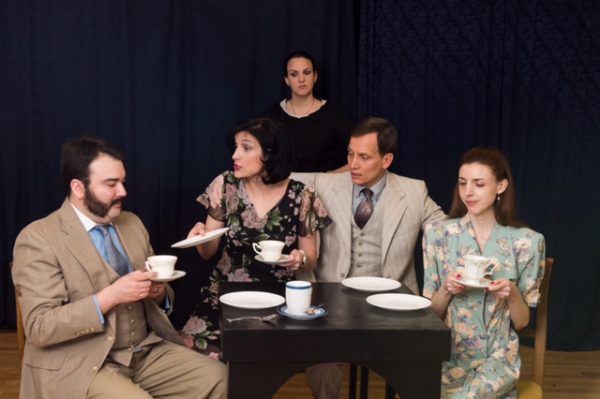Some plays are like peeping through your eye doctor’s phoropter — layer upon layer of filters. Say, a playwright of the Roaring Twenties borrows a style of the 1660s English Restoration period that gets refracted centuries later. (Hint: Bring Cliffs Notes!) Others are like Rorschach tests: One patron sees two hours of satire and push-pull sexual tension, while another shields himself from shades of domestic violence and boorish afflictions of the idle rich.

Noël Coward’s 1930 play Private Lives — the sparkling 200th production by the Reston Community Players (RCP), a performing arts society now in its 50th season — will delight students of theater and hedonists alike. It’s billed as a “comedy of manners,” a style that mocks a specified social class – in this case, upper-crust Brits of privilege and means who spend time debating the virtues of sunbathing or whether it’s “the time of year for Tunis.”
On the surface, the story is of a divorced couple unexpectedly honeymooning with their new spouses in adjacent suites at the same French hotel. Fireworks ensue and they flirt with rekindling their fickle flame.
Underneath, it’s about the natural insecurities stoked by love and an artificial morality prescribed by society and conscribed through marriage.
The fact that this 87-year-old play, written in just four days while Coward battled influenza, remains relevant and entertaining is a big credit to his genius. But RCP Producer Laura Baughman and Director Adam Konowe have roused a museum piece to life. Konowe charmingly choreographs the action; the players seductively pose and dance even when there’s no music playing.
Suave, elegant actor Richard Isaacs is Elyot Chase — a role originated by Coward and tackled by the likes of Richard Burton, Alan Rickman, and even, briefly, Charles Nelson Reilly. Isaacs manages to blend physical comedy with flinty grace, hinting at the conflicted undertow of a closeted Coward.

But the production’s locomotive is Rachael Hubbard, playing Chase’s ex, Amanda, on all cylinders. She’s more dazzling than her jewels and glamorous get-ups designed by Charlotte Marson and Judy Whelihan. Trapped in an era when divorce was only half as common as today, according to data from the Centers for Disease Control and Prevention, she’s the ballsy, progressive sophisticate who bogarts her smokes like Bette Davis and commands our full attention.
Both Hubbard and Isaacs use their full vocal ranges – no, it’s not a musical, but their voices zip-line through Coward’s witty dialogue with harmonious bravado.
Rounding out the cast is Caity Brown as a meek, quibbling Sybil Chase; Andy Gable as the dapper, stiff-upper-lip Victor Prynne; and the saucy Lisa Young in a cameo as a French maid (no subtitles, and none needed).
One needs note an interesting intersection in the character names. Amanda’s new married surname is Prynne – the same as the female protagonist’s in Nathaniel Hawthorne’s 1878 The Scarlet Letter. Hester Prynne was enmeshed in contradictions of purity and the fallen woman, transparency and shame. Meanwhile, “Mandy” Prynne is an early feminist and Chase gives chase even while his instinct is to run away. Is this insight into Coward’s own private life? Could this be why his foil/rival, who at one point calls Chase a coward, is named Victor?
The two-set, three-act play climaxes midway — both with a stunning Parisian apartment set design by Maggie Modig (also painted by Barbara Swart and Elizabeth Aurelia, detailed in lush art-deco and with Montmartre silhouetted at the window) and decorated with eye-popping indulgence by Bea and Jerry Morse and Julia Cherundolo. The play’s second-act love scene, nearly censored in Britain as too risqué, frolics from gramophone to baby grand, giving Sound Designer/Sound Board Operator William Chrapcynski a chance to show off. Both the sound and lighting (engineered and executed by Micheal O’Connor) are flawless.
All told, this provocative duel between what’s “normal” and who’s screwy is among RCP’s classiest acts.
As Amanda tells her new husband:
I think very few people are completely normal really deep down in their private lives. … If all the various cosmic thingummys fuse at the same moment, and the right spark is struck, there’s no knowing what one mightn’t do.
Coward wrote the song “Someday I’ll Find You” for this play:
’ll leave you never, love you forever, All our past sorrow redeeminI
— while RCP features his composition “I Travel Alone” in ironic refrain as the world-weary continentals recite their blasé travelogues:
No chains can ever bind me, No remembered love can ever find me.
In other words: If my ex could see me now! Ruh-roh: They might be lurking just over the next hedge. Because, even at the theater, there’s no escaping the confines of one’s foolish heart.
Running Time: Two hours and 10 minutes, with a 15-minute intermission.
Private Lives plays through May 20, 2017, at Reston Community Players performing at the Reston Community Center’s Center Stage – 2310 Colts Neck Road, in Reston, VA. For tickets, call the box office at (703) 476-4500, or purchase them online.





